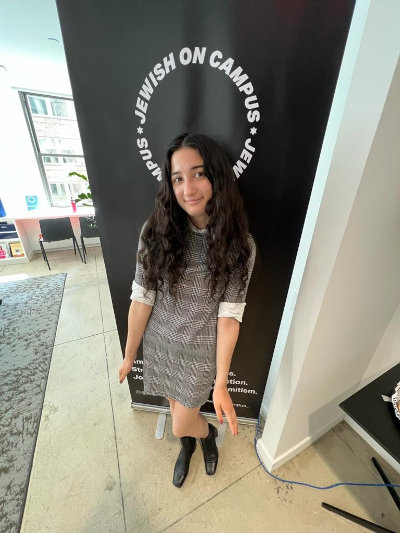 Identifying as a Jew
Identifying as a Jew


5 min read
Growing up, Lyric Crane faced ridicule for being Jewish. Now she’s fighting antisemitism and striving to prevent more hate.
When Lyric Crane was in the eighth grade, her public school taught students about the Holocaust. They’d read primary source documents and hear stories from local survivors in her small town in Washington State. But the curriculum didn’t address the importance of diversity and being tolerant of others’ differences and the Holocaust became something non-Jewish students at Crane’s school joked about.
“I was the only Jewish student in my grade and I became the sole target for Holocaust jokes, comparisons, and comments,” said Crane, who is now 21. “I wish that the curriculum included tools for teachers to spot and stop antisemitism from happening in the classroom. This kind of training would have protected me from experiencing such hateful conduct at school.”
Crane consistently faced antisemitism from elementary school until she left for college. She grew up with virtually no Jewish community, and aside from the Holocaust jokes, heard antisemitism tropes and slurs and was even threatened with physical violence for being Jewish.

“I grew up afraid to be Jewish and learned how to turn that fear into motivation, both for change and for joy.”
When Crane went off to college at Western Washington University, she minored in Holocaust and genocide studies and was president of the Hillel student board. Today, she’s studying education through Masa Israel Teaching Fellows, a 10-month fellowship in Israel. Her goal is to become a Holocaust educator and change the way that students learn about the Holocaust in the United States.
Her first order of business? To make Holocaust education more wide-spread.
#How can we expect to have successful Holocaust education if more than half of the U.S. doesn’t learn about it in school?
“The biggest issue with Holocaust education is that it is not mandated in more than half of U.S. states,” she said. “How can we expect to have successful Holocaust education if more than half of the U.S. doesn’t learn about it in school?”
According to Crane, because of the lack of education, people are learning about the Holocaust from distorted and inaccurate information they find online.
When students do learn about the Holocaust in the classroom, Crane believes the lessons must be based on curriculum that experts at Holocaust museums or other educational organizations develop.
“This curriculum should be focused on survivor testimony, either orally or through autobiographical text. There is no need for inaccurate books such as The Boy in the Striped Pajamas when an overwhelming amount of written survivor testimony is out there. There is no better way to learn about the Holocaust than through the people who experienced it and by the people who have dedicated their lives to studying it.”
 Lyric, second left, with President Herzog
Lyric, second left, with President Herzog
During her time in Israel, Crane has received hands-on training on how to teach in a classroom. She was also one of four Masa fellows who met with Israeli President Herzog to discuss how they faced antisemitism and how they fight it in their everyday lives.
When her fellowship ends this June, Crane is going to continue to teach about the Holocaust so that no other Jewish kids will have to go through what she did growing up. She also believes that through her work, she can prevent antisemitism from spreading and bring about more understanding of the Jewish community.
“I feel like I have a responsibility as a Jewish person to remember as much as I can about the Holocaust,” she said. “I can feel the dangers of antisemitism rising up and I feel like I have to do everything in my power to prevent it from happening again. This kind of work is not for everyone – it’s emotionally draining and difficult even on the best days. But I know that I am capable of studying it, and if I am capable of doing it, then I have the responsibility to.”
1. Become educated on the roots of antisemitism. Learn the history behind antisemitic tropes and beliefs, that way when you confront them you can have an informed and productive conversation.
2. Approach conversations with the goal of learning in mind. You won’t be able to educate people if they think that you are attacking them. Give people understanding whenever you can.
3. Find a community to draw strength from. You will need them, whether they are there to celebrate Judaism or to support you in times of antisemitism. They will understand your pain and motivate you to keep fighting.
4. Cultivate Jewish joy whenever you can. Fighting antisemitism is emotionally draining and it’s important to make positive associations with your Jewish identity.
5. Engage with your Jewish identity with pride! If you don’t feel ready to directly confront antisemitism, show the world how beautiful Judaism can be. Wear your Star of David in public or put a mezuzah on your door. Confront antisemitism by showing the world that Judaism will continue to thrive, despite all odds.

May G-D bless Lyric - with the wisdom to put together - a teaching curriculum - that will be effective in dealing with - those uneducated with the truth - and deniers. Especially having at hand - access to documented proofs - of the horror of the Holocaust - as well as current terrorist activity. Why? - I recently saw a TV journalist confront a Pro-Palestinian demonstrator - and the journalist - hadn't anticipated the demonstrator calling what they were told - was fake Israeli lying propaganda. If the journalist had had things to show - like a known video of a Palestinian - who they said was killed by Israel - and fell off the burial stretcher - then by himself - got up - and got back on the stretcher. So - he could have said - it can be shown - who's doing the lying?